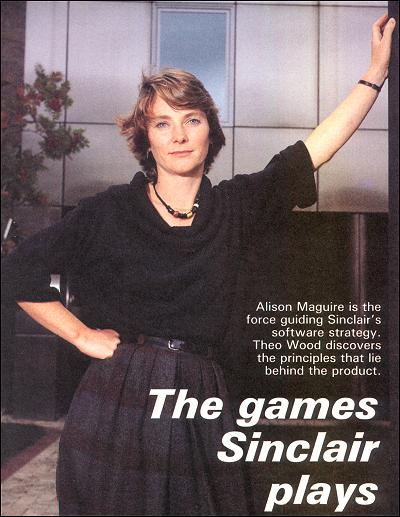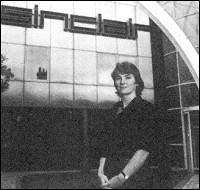| Inside Sinclair |

Alison Maguire is one of the more successful women in the computer industry, and as software director for Sinclair Research has seen her department grow from scratch to worldwide proportions in the two years since she joined.
Things were very different on the software scene then, back in January 1983. The Spectrum had been on the market for seven months and Sinclair had been involved in software at a marginal level only, with very few titles available. People who bought Spectrums around that time will remember only too well the level of software provision - certainly nothing in comparison to what is available today.
What, then, are her main considerations as software director? "I'm basically concerned with software publishing but in fact there is an overall responsibility to ensure that our hardware doesn't fail to sell for lack of software. At one end of our involvement we have a commitment to software for its own sake. At the other end we encourage companies to develop software which we might not sell ourselves, but which would make the hardware more attractive to a particular market."
To begin with the Sinclair involvement was limited to obtaining a licence to market software which was already being sold.
On arriving at Sinclair Research Maguire concentrated on familiarising herself with the Spectrum and the ZX-81, as well as the various titles which were available. Her main task was to take account of the market and the products and then to define a software strategy, although as she says, "It's very difficult to define an overall software strategy, as we are really a hardware manufacturer. For example, when it comes to deciding to bundle software, I lose part of my product line, but if we sell another 10,000 computers because of it then it's very worthwhile."
The QL is the first computer which has seen activity on the software front from inception, exemplified by the inclusion of the Psion packages in the hardware product. "Since the launch in January, about 300 companies have written to us, asking for a variety of assistance with both the development of software and peripherals. That puts us in a very nice position for identifying products we are interested in."
That also generates feedback of ideas and Maguire's department is in the front line of liaison between the labs and the various companies who apply for assistance. Those companies provided an early testing ground for the QL, and indeed some were paid to do that work. Such an arrangement is an advantage in that any bugs which might exist can be eliminated at an early stage with full co-operation between the labs and the software house concerned.
Since the early days things have changed a great deal. Maguire now oversees a department comprising of two editors, a software engineer, two secretarial/PA people and a software product manager responsible for marketing and to a certain extent production as well.
"This size of team is pretty new; in June 1984 I had only a secretary. There is now a greater commitment to software. The aim is to go into software publishing for the QL, and to take advantage of the fact that we are the hardware manufacturer.
Although almost half the Spectrum sales are overseas, the Spectrum+ will have a further impact on those markets. The new user guide will have been translated into 19 languages by Christmas 1984 and software sales will presumably follow hardware. How does Sinclair Research intend to take advantage of that?
"There are various ways in which we are tackling it. Wherever we've got a new branch office - as in Germany, Italy or France - we have local software managers already appointed. I will meet them regularly so we have information flowing back and forth. We are looking at a variety of arrangements for getting English software translated, though it's not always appropriate to translate software."
In recent months large foreign publishing companies have approached Sinclair as to distribution rights. If local branch offices agree Sinclair may deal direct especially if the company has a sound background. "Up until now it's been only titles in our catalogue for which we have discussed foreign rights. There hasn't been anyone who has had the time to think carefully about foreign rights, because we have been so busy setting up the new department and the QL. We are now thinking about it and it's occurred to me that as with the expansion pack, which is totally non-Sinclair, it may be time to offer non-Sinclair suppliers a chance to get at our distributors. I'm considering ways to invite people to do so. In some foreign markets it is very difficult to make money out of software but we still need it to be there. If we can provide an easy route for the software to be there legally then we will make it less easy for the pirates."
| "People in Britain don't want to be educated at home. Most parents want to buy something that amuses their children." |
There has been a lot of talk about the education market overtaking the games market. "Last year we were talking about schools and the DoI scheme, in which the Spectrum was involved. We published some titles in association with Macmillan and I wanted Sinclair to be involved with a respected long-standing name in education because I thought we were viewed possibly as fly-by-nights.
"However, that market has been disappointing. I think that whether or not all the educationalists would like it, educational software has not sold well. People in Britain don't want to be educated at home, unlike in the States. The idea was ahead of its time, but it may happen soon because educational software now is more entertaining than before. The difficulty is deciding who are you selling to, parents or children. Most parents are indulgent and want to buy something that amuses their children."
Edutainment? "I loathe that word. Although the extraordinary thing is I sometimes wonder whether our view, as adults, about what children should enjoy is wrong."
Maguire was recently sent a program which was a simulation of property dealing and rent management and her two daughters of nine and 11 spent a whole day playing with it.
"They said it was the best program they had ever played, and at the end of that time they knew what a balance sheet was and something about the relationship between managing people and making profits. I was amazed at this; it wasn't the zap-it-up game which they usually like. Nevertheless it's difficult to sell that type of game to retailers."
What does she feel about the current image of computers, dominated by games which appeal mostly to boys?
"Obviously, when we look for software here we try to discourage violence but if we apply that kind of rule rigidly we would he turning down half the games. I think perhaps that zap-it-up games are becoming a little bit old hat. But then for every group of people for whom it is old hat there's another group coming up."

Maguire sees big growth ahead in the tertiary sector of education - that is, the universities and polytechnics as well as abroad. She would like to concentrate on titles which showed the machines to be something special, as rule and drill programs are scarcely likely to distinguish Sinclair machines from any other. A computer which may be an intelligent work station for university students would sell in large quantities at corporate level. Sinclair is hoping that the QL will fulfil that need. The BBC micro has been the mainstay of this market, and the QL will have to work hard to beat it.
What plans are there for QL software in the next six months? "Our first titles were announced in QLub news in October. A lot of it is development software, things like compilers which have a roll-on effect. We also have some business software coming out before the end of this year. We've got the Psion chess program too, but I must say games are not the major emphasis for the QL, although the chess program is important as it shows what the QL can do visually. We'll be launching titles every month now for the QL."
A number of people are, however, working on games for the QL and Sinclair has bought an option on the Imagine megagame Bandersnatch. Psion, too, has games under development.
Talk of that kind could lend easily to the idea that Sinclair had now forsaken the Spectrum in favour of the QL, and many Sinclair users must feel this way. Does this mean that the Sinclair involvement with Spectrum software in the U.K. will be limited to carrying the present titles?
"Oh no. Not at all. The Spectrum+ is an indication that we think there's a lot of life in that little horse yet. We published seventeen titles for the Spectrum in the autumn. They are all 'educationals', fifteen from Macmillan and two from Psion and ASK, There's tremendous mileage in the Spectrum and we'll certainly be looking for more software for it, although when there's the choice between making some money out of a new game for the Spectrum, which is not going to sell any more Spectrums, and making a piece of software available for the QL, which is going to sell the QL to a whole new market, my emphasis has to he on the latter."
It is clear that Sinclair is now poised for overseas expansion, and the groundwork for a large multinational company is being laid. No doubt when the QL production lines have satisfied the demand in the U.K., that too will follow in the steps of the Spectrum. Just as a Coke can be found in extraordinary places, intrepid travellers may find a Spectrum where they least expect it.